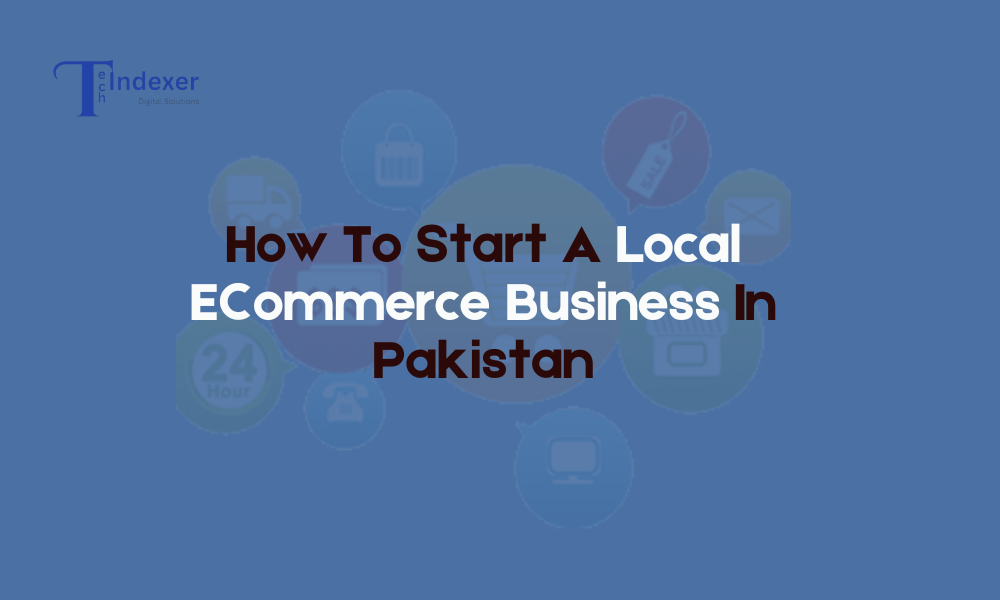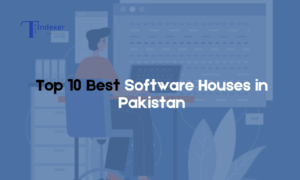Launching your local E-commerce Business in Pakistan: A Step-by-Step Guide. The e-commerce landscape in Pakistan is flourishing, offering exciting opportunities for entrepreneurs.
Here’s a roadmap to help you navigate the process of starting your E-Commerce Business in Pakistan:
1. Identify Your Niche and Target Market:
To succeed in the competitive world of e-commerce, identifying your niche and target market is crucial. By following these simple steps, you can identify a profitable niche and target market for your e-commerce business in Pakistan:
Firstly, assess your interests and expertise to identify a niche that aligns with your passions and skills. Then, conduct thorough market research to identify potential niches and target markets in Pakistan. Analyze trends, customer preferences, competition, and market demand in various industries or product categories. And evaluate demand and competition to determine unique selling propositions that make your business stand out from the rest.
Next define your target audience to tailor your marketing efforts and product offerings to meet their needs effectively. And validate your ideas to refine your offerings and identify any areas for improvement before launching your e-commerce business.
2. Choose the Right Products to Sell:
The second step to begin a fruitful E-Commerce business in Pakistan is that choosing a concise version of the right products to sell:
Align Passion with Market Demand:
- Find a niche you’re passionate about that has demand in Pakistan. Research trends, competitor offerings, and cultural relevance.
Target Audience and Product Selection:
- Define your ideal customer (age, location, interests) to guide product selection.
- Curate high-quality products that cater to your target audience’s needs and preferences. Consider seasonality and cultural events.
Sourcing and Profitability:
- Partner with reliable suppliers (artisans, wholesalers, manufacturers) who offer quality products and efficient fulfillment.
- Analyze potential profit margins considering product cost, shipping, platform commissions, and marketing expenses.
Bonus Tips:
- Start small and scale up based on demand.
- Identify your USP (unique selling proposition).
- Test and adapt your product selection based on sales data and customer feedback.
3. Register Your Business:
- Legality: Formalize your business by registering with the relevant government authorities. Options include sole proprietorship, partnership, or private limited company, each with its own advantages and legal requirements.
- National Tax Number (NTN): Obtain an NTN from the Federal Board of Revenue (FBR) to comply with tax regulations.
4. Choose Your E-commerce Platform:
- Local Marketplaces: Popular local marketplaces in Pakistan include Daraz.pk, [invalid URL removed], and [invalid URL removed]. These platforms offer established customer bases and user-friendly interfaces but may involve commission fees.
- Self-Hosted Website: For greater control and branding opportunities, consider building your own e-commerce website using platforms like Shopify or WooCommerce. This requires more technical expertise and upfront investment but allows for greater customization.
5. Create a Compelling Online Presence:
- Professional Website: If building your own website, ensure it’s user-friendly with high-quality product images, detailed descriptions, and secure payment gateways like Easypaisa or JazzCash.
- Social Media Marketing: Leverage social media platforms like Facebook, Instagram, and YouTube to reach your target audience. Showcase your products, run engaging campaigns, and build brand awareness.
6. Marketing and Customer Acquisition:
- SEO Optimization: Optimize your website and product listings for relevant keywords to improve search engine ranking and organic traffic. Consider partnering with a local SEO specialist for better results.
- Paid Advertising: Explore paid advertising options on social media platforms and search engines to reach a wider audience. Utilize targeted campaigns to connect with potential customers actively searching for your products.
- Content Marketing: Create informative and engaging content related to your niche. Blog posts, social media posts, and video tutorials can attract potential customers, establish your brand as an authority, and improve SEO.
7. Logistics and Fulfillment:
- Delivery Partners: Partner with reliable local courier services like TCS, Leopard Courier, or DHL to ensure efficient product delivery across Pakistan. Offer different delivery options and clearly communicate shipping costs and timelines.
- Inventory Management: Maintain an organized inventory system to avoid stock outs and customer disappointments. Track product quantities, update stock levels regularly, and establish a system for order fulfillment. Consider using a Warehouse Management System (WMS) if you plan to scale your business.
8. Customer Service:
- Building Trust: Prioritize excellent customer service to build trust and loyalty. Respond promptly to inquiries, resolve issues efficiently, and offer clear return and exchange policies.
- Collect Feedback: Actively seek customer feedback through surveys and reviews. Use this feedback to improve your product offerings, website functionality, and overall customer experience.
The high failure rate of e-commerce businesses in Pakistan:
There are several factors contributing to the high failure rate of E-Commerce business in Pakistan:
Market Challenges:
- Low Internet Penetration and Digital Literacy: While internet penetration is growing in Pakistan, it’s still not as widespread as in developed countries. This limits the potential customer base for e-commerce businesses. Additionally, a segment of the population may lack the digital literacy required for comfortable online shopping.
- Cash-Dominated Economy: Pakistan remains a largely cash-based society. While digital payment options are gaining traction, many customers still prefer COD (Cash on Delivery) or are hesitant to use online payment methods due to security concerns. This can limit conversion rates and potentially lead to abandoned carts.
- Infrastructure Limitations: Reliable and affordable logistics networks can be a challenge in some areas of Pakistan. This can lead to delayed deliveries, damaged goods, and customer dissatisfaction. Additionally, inconsistent power supply can disrupt online operations.
Business Operational Challenges:
- Lack of Business Planning and Strategy: Some e-commerce businesses might launch without a well-defined business plan, comprehensive market research, or a clear target audience. This can lead to poor product selection, ineffective marketing strategies, and difficulty competing in a crowded marketplace.
- Inventory Management Issues: Maintaining adequate stock levels without overstocking can be a challenge. Stockouts can frustrate customers, while excess inventory ties up capital and can lead to dead stock if not managed effectively.
- Marketing and Customer Acquisition Costs: Reaching the target audience and acquiring new customers can be expensive. Without a well-defined marketing strategy and efficient use of resources, customer acquisition costs can eat into profits. Additionally, competition for online visibility is fierce, requiring strategic use of marketing tools and platforms.
Other Factors:
- Limited Access to Capital: Securing funding for e-commerce startups can be difficult in Pakistan. This can hinder growth and limit the ability to invest in essential areas like marketing, technology, and inventory management.
- Lack of E-commerce Expertise: Running a successful e-commerce business requires a specific skillset, including knowledge of digital marketing, website development, and e-commerce platforms. A lack of expertise in these areas can lead to operational inefficiencies and hinder growth potential.
However, there’s a bright side!
The Pakistani e-commerce market is experiencing significant growth. By understanding the challenges and implementing effective strategies, entrepreneurs can increase their chances of success. The tips provided earlier on choosing the right products, building a strong online presence, and prioritizing customer service are all crucial for overcoming these hurdles. As internet penetration continues to rise and digital literacy improves, the future of e-commerce in Pakistan holds promise for businesses that can adapt and deliver exceptional customer experiences.
Here are some ways to find wholesale products at cheap rates in Pakistan:
Traditional Wholesale Markets:
Here are some ways to find wholesale products at cheap rates in Pakistan:
- Major cities in Pakistan have large, dedicated wholesale markets for various products. These can be a great way to find a wide variety of items at competitive prices. Here are some examples:
- Shahalami Market, Lahore: Offers a vast selection of clothing, textiles, and fabrics.
- Sewarat Bazaar, Karachi: Known for electronics, mobile phones, and appliances.
- Anarkali Food Street, Lahore: Specializes in wholesale spices, grains, and food items.
Manufacturer Direct:
- Consider contacting manufacturers directly, particularly for specific product categories. This can potentially lead to lower prices by cutting out middlemen. Research local manufacturers or attend trade shows to connect with them.
Important Considerations:
- Minimum Order Quantities (MOQ): Wholesale suppliers often have minimum order quantities (MOQ) that you need to meet to qualify for wholesale pricing. This might not be suitable if you’re just starting out.
- Payment Terms: Negotiate payment terms with wholesalers. Some may require upfront payment, while others might offer credit facilities.
- Quality Checks: When sourcing from new suppliers, conduct thorough quality checks on the products before committing to a large order.
Additional Tips:
Having a solid foundation for your e-commerce business in Pakistan is crucial, but ongoing optimization is key to sustainable growth. Here are some additional professional strategies to consider:
Marketing and Brand Building:
- Leverage Influencer Marketing: Partner with local social media influencers whose audience aligns with your target demographic. These collaborations can amplify brand awareness and product visibility to a highly engaged audience segment.
- Strategic Promotions: Implement strategic flash sales and promotional offers to achieve multiple objectives. Attract new customers, clear out inventory, or generate excitement around product launches – tailor promotions to your specific needs.
- Loyalty Programs Foster Advocacy: Develop a customer loyalty program that incentivizes repeat business and fosters brand advocacy. This could involve tiered reward structures, exclusive discounts, or early access to new products. Partnering with other local businesses for cross-promotional opportunities can further expand your reach and customer base.
Building Trust and Customer Satisfaction:
- Offer Cash on Delivery (COD): Especially in the initial stages, consider offering COD as a payment option. This caters to customers who might be hesitant to pay online upfront, building trust and encouraging purchases.
- Invest in High-Quality Product Representation: Professional product photography and detailed, accurate descriptions are essential. This reduces confusion for customers, ensures realistic expectations, and ultimately leads to higher satisfaction.
- Prioritize Transparency: Clearly communicate shipping timelines, return policies, and any other relevant information on your website and during checkout. Transparency builds trust and avoids customer frustration.
- Harness Customer Feedback: Encourage customers to leave reviews and testimonials on your website and social media platforms. Positive feedback acts as social proof, significantly influencing buying decisions for potential customers.
Compliance and Legal Considerations:
- Protect Intellectual Property: Ensure you have the necessary rights to sell any products with trademarks or copyrights. Partnering with reputable suppliers and adhering to licensing agreements is crucial.
- Prioritize Data Privacy: Be aware of and comply with data privacy regulations in Pakistan, such as the Personal Data Protection Bill (PDPB). Implement robust measures to protect customer data security, fostering trust and potentially avoiding legal repercussions.
Scaling and Growth:
- Data-Driven Decision Making: Leverage website analytics tools to track customer behavior, identify trends, and optimize your marketing efforts for better results. Data insights inform strategic decision-making, maximizing return on investment.
- Explore Search Engine Marketing (SEM): Consider implementing SEM strategies like Google Ads. This allows you to reach a wider audience actively searching for products related to your niche, driving targeted traffic to your online store.
- Expand Your Reach: Once your business is established, explore expanding your reach by listing your products on additional local and international marketplaces. This opens doors to new customer segments and potentially boosts sales.
Staying Ahead of the Curve:
The e-commerce landscape in Pakistan is dynamic. Stay informed about industry trends, adapt your strategies accordingly, and continuously strive to provide an exceptional customer experience. By prioritizing these additional considerations, you can position your local e-commerce business for long-term success in the ever-evolving Pakistani market.




